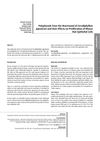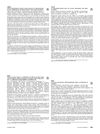 26 citations,
November 2002 in “Planta medica”
26 citations,
November 2002 in “Planta medica” Extracts from Cercidiphyllum japonicum wood can stimulate mouse hair cell growth like common hair growth treatments.
 119 citations,
June 2005 in “Journal of Molecular and Cellular Cardiology”
119 citations,
June 2005 in “Journal of Molecular and Cellular Cardiology” Potassium channel openers are effective in treating heart conditions, high blood pressure, pulmonary diseases, bladder issues, and hair loss, but more selective drugs are needed.
 34 citations,
January 2018 in “International Journal of Dermatology”
34 citations,
January 2018 in “International Journal of Dermatology” Scalp cooling is the most effective FDA-approved method to prevent chemotherapy-induced hair loss, but more research is needed for other treatments.
 11 citations,
December 2014 in “Clinical Obstetrics and Gynecology”
11 citations,
December 2014 in “Clinical Obstetrics and Gynecology” Obstetrician/gynecologists can diagnose and manage female hair loss with careful history taking and examination.
 8 citations,
March 2006 in “Seminars in Cutaneous Medicine and Surgery”
8 citations,
March 2006 in “Seminars in Cutaneous Medicine and Surgery” Hair transplantation has improved to look more natural, but managing patient expectations and using precise techniques are key for the best outcomes.
 1 citations,
May 2017 in “InTech eBooks”
1 citations,
May 2017 in “InTech eBooks” Some cosmetic procedures show promise for treating hair loss, but more research is needed to confirm their safety and effectiveness.
 July 2018 in “Elsevier eBooks”
July 2018 in “Elsevier eBooks” Some drugs can cause reversible hair loss, but certain chemotherapy drugs may lead to permanent hair loss; drugs can also change hair color and texture.
 1113 citations,
August 1999 in “The New England Journal of Medicine”
1113 citations,
August 1999 in “The New England Journal of Medicine” Hair follicle biology advancements may lead to better hair growth disorder treatments.
 23 citations,
November 2018 in “Journal of the European Academy of Dermatology and Venereology”
23 citations,
November 2018 in “Journal of the European Academy of Dermatology and Venereology” The study concluded that severity of Frontal fibrosing alopecia is not linked to how long someone has it, can start before menopause, and eyebrow loss may be an early sign.
 18 citations,
June 1999 in “Statistical Methods in Medical Research”
18 citations,
June 1999 in “Statistical Methods in Medical Research” The document concludes that PK/PD modeling is important for determining the safe and effective dosages of drugs.
 November 2019 in “Harper's Textbook of Pediatric Dermatology”
November 2019 in “Harper's Textbook of Pediatric Dermatology” Understanding normal hair growth and loss in children is key to diagnosing and treating hair disorders.
 August 2019 in “Journal of The American Academy of Dermatology”
August 2019 in “Journal of The American Academy of Dermatology” Bleach baths with 0.005% hypochlorite help manage atopic dermatitis by affecting skin cells and reducing itchiness.
 January 2019 in “Springer eBooks”
January 2019 in “Springer eBooks” Modified HDL can better deliver drugs and genes, potentially improving treatments and reducing side effects.
 46 citations,
March 2013 in “Journal of Cosmetic and Laser Therapy”
46 citations,
March 2013 in “Journal of Cosmetic and Laser Therapy” Non-ablative and ablative fractional lasers helped hair growth in some cases without major side effects, but didn't work for all hair disorders.
 11 citations,
January 2001 in “Cambridge University Press eBooks”
11 citations,
January 2001 in “Cambridge University Press eBooks” Androgens can cause hair growth in some areas but hair loss on the scalp.
 257 citations,
July 2018 in “Obstetrics & Gynecology”
257 citations,
July 2018 in “Obstetrics & Gynecology” PCOS is a complex disorder in women that can lead to various health risks and requires personalized treatment.
 23 citations,
November 2017 in “Stem cell investigation”
23 citations,
November 2017 in “Stem cell investigation” Platelet lysate is more effective than activated autologous platelet-rich plasma or saline in improving hair growth after hair restoration surgery.
 7 citations,
March 2016 in “Journal of Cosmetic and Laser Therapy”
7 citations,
March 2016 in “Journal of Cosmetic and Laser Therapy” Home-use lasers and IPL devices are unlikely to directly cause paradoxical hair growth; it may be linked to inflammation or hormonal issues.
 5 citations,
January 2021 in “Journal of Saudi Chemical Society”
5 citations,
January 2021 in “Journal of Saudi Chemical Society” Watercress oil may promote hair growth by activating specific receptors.
 1 citations,
July 2024 in “Journal of Cosmetic Dermatology”
1 citations,
July 2024 in “Journal of Cosmetic Dermatology” Low SULT activity in hair follicles leads to better response to oral minoxidil for hair loss.
 August 2023 in “Drug Design Development and Therapy”
August 2023 in “Drug Design Development and Therapy” Minoxidil may work for hair loss by reducing androgen sensitivity and altering hormone-related enzymes.
June 2024 in “European Journal of Pharmaceutics and Biopharmaceutics” Using photoacoustic waves to deliver minoxidil improves hair growth effectively and safely.
 January 2024 in “Frontiers in Bioengineering and Biotechnology”
January 2024 in “Frontiers in Bioengineering and Biotechnology” A new method using stem cell membranes to deliver Minoxidil improved hair growth in mice better than Minoxidil alone.
February 2024 in “International journal of molecular sciences” UV exposure reduced hair shine in mice, but minoxidil helped restore it.
1 citations,
January 2021 in “Skin appendage disorders” Alopecia areata in children is usually mild and effectively treated with strong topical steroids.
 6 citations,
October 2005 in “Indian Journal of Dermatology”
6 citations,
October 2005 in “Indian Journal of Dermatology” The document discusses male and female pattern hair loss, its diagnosis methods, FDA-approved treatments like finasteride and minoxidil, their side effects, and the role of lifestyle changes.
 5 citations,
May 2020 in “Diagnostics”
5 citations,
May 2020 in “Diagnostics” Lower zinc levels may predict less effective hair loss treatment.
June 2022 in “Conjunctions” YouTube videos of men using Finasteride and Minoxidil for hair and beard growth form a unique self-tracking genre that helps build community and shape male identity.
 46 citations,
May 2018 in “Dermatologic Surgery”
46 citations,
May 2018 in “Dermatologic Surgery” PRP injections effectively treat hair loss, with positive results in both monthly and every three months treatments.
 3 citations,
September 2022 in “Archives of dermatological research”
3 citations,
September 2022 in “Archives of dermatological research” The fractional carbon dioxide laser is a safe and effective treatment for alopecia areata and works better than betamethasone valerate cream alone.

























